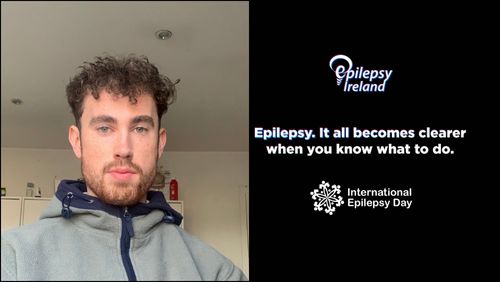
For International Epilepsy Day 2025, Kevin Traut has shared his experiences of living with epilepsy, with a particular message for others living with epilepsy and the public…
I was diagnosed with epilepsy in 2019. I was in my teens at the time and while a diagnosis of epilepsy can never come at the “right” time, I found the diagnosis particularly difficult – as we all know the teenage years are when we all tend to look for peer validation and acceptance. I had a fear of being judged and misunderstood and this fear followed me throughout my teenage years and into my early years at third level.
Originally, my seizures were very frequent – occurring monthly at the beginning of my journey but over the past few years reduced to become less often – occurring every 6 months. As I write this, I am pleased to say that I am just over one year seizure free – which thinking back, is a milestone that seemed unattainable when I was first diagnosed.
One of the most challenging aspects of living with epilepsy is coming to terms with the condition and accepting yourself for who you are. Living with epilepsy often means learning to navigate a world that can feel different or more challenging, especially when you realise that there are things others might take for granted — like memory, energy, or physical coordination.
The process of self-acceptance is deeply personal and can be particularly tough when you're constantly reminded of the differences in your experience compared to those around you. I understand more now that it is natural to feel frustrated by the limitations that epilepsy can place on my memory or daily functioning, especially when others may not understand or notice the challenges I face.
However, embracing my condition while refusing to let it define or control my life can be a powerful act of resilience. It’s about acknowledging your struggles without letting them limit your potential. In doing so, you're not just managing your epilepsy — you're redefining your relationship with it, allowing yourself to accept who you are, and living beyond the constraints that others might unintentionally place on you. This journey of self-acceptance and strength is one that many with chronic conditions can relate to.
For me, managing my epilepsy involves a combination of medication, lifestyle adjustments, and emotional resilience. I try to adopt practises in these three areas to give me the best chance of living an everyday life and remaining seizure free.
I wanted to share my experience for International Epilepsy Day to share a message to two important groups – those who are newly diagnosed and to the wider public.
Firstly, to those who are newly diagnosed I would say I know this diagnosis might feel overwhelming and scary but try not to let it define you. It’s normal to have questions and feel uncertain but remember that you’re not alone in this. There’s a whole community of people living with epilepsy who understand what you're going through, who want to help you, and there are treatments and supports available to help you manage it. Take it one step at a time — it’s okay to feel frustrated or confused but don’t let that stop you from living the life you want. You’ll learn to adapt, and over time, it’ll become just one part of who you are, not the whole of you. You are going to learn so much about yourself so be kind to yourself, lean on those around you, accept their love and don’t be afraid to seek support when you need it. Your life is not defined by epilepsy — you still have so much potential and so many opportunities ahead.
To the public, I would say that despite epilepsy being one of the most common neurological disorders, misconceptions and stigmas persist. Many people still associate epilepsy primarily with seizures, often without understanding the variety of seizure types or how epilepsy affects individuals in daily life. For example, there is limited awareness of non-visible symptoms, such as cognitive or emotional challenges, and the fact that not all seizures involve convulsions.
For me, the most important thing for the public to know about epilepsy is that it is a medical condition that affects people in diverse ways, and it is not a one-size-fits-all experience. Epilepsy is a neurological disorder characterised by recurring seizures, but the nature and frequency of seizures can vary widely between individuals. Some people may have convulsive seizures, while others may experience non-convulsive ones, such as absence seizures, which are less visible.
It's crucial for the public to understand that epilepsy can be managed and mitigated with proper treatment, and many people with epilepsy lead full, successful lives. Dispelling myths, such as the belief that all seizures involve violent shaking or that people with epilepsy are permanently incapacitated, helps reduce stigma and promotes better support for individuals living with the condition. Additionally, fostering an understanding of how to assist someone during a seizure and those important words of TIME, SAFE, STAY can make a significant difference in creating supportive environments.
I hope my story and experiences helps anyone who feels they are alone and encourages the wider public to learn more about this incredibly common condition. Thank you for reading and remember, you are not alone.
Thank you, Kevin, for this incredible piece, which we have no doubt will speak to both people with epilepsy and the wider public. If you would like to share your experience of living with epilepsy, visit the 'Become a Media Volunteer' page on our website.
